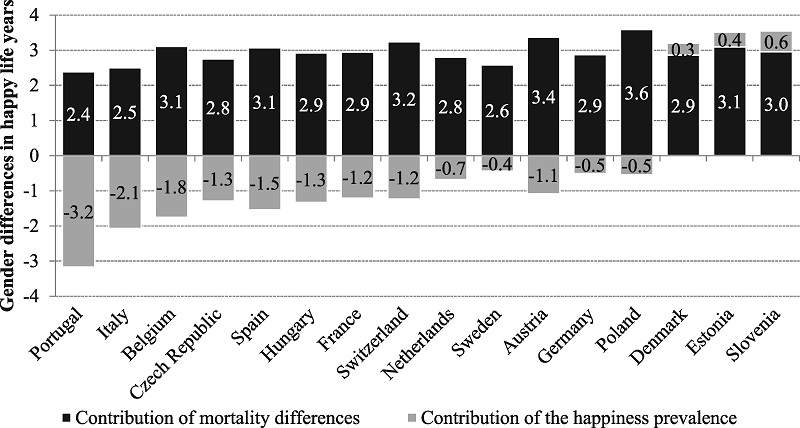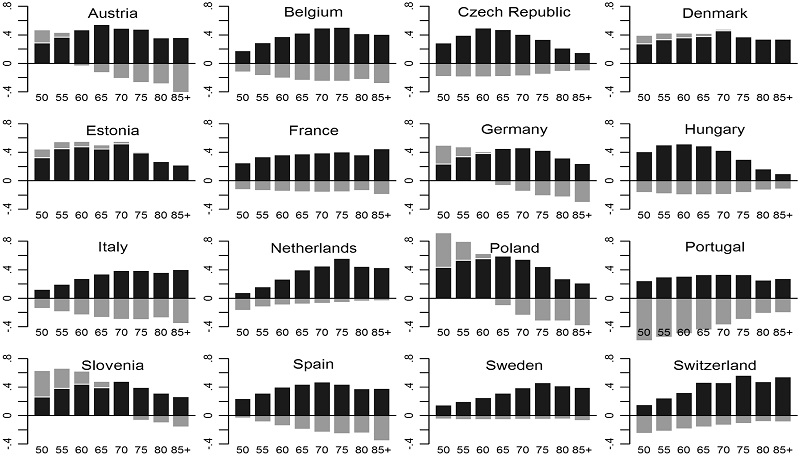Women in Europe live longer than men, but less happily
Women in Europe live longer than men, but less happily
Aïda Solé-Auró, a researcher with the Department of Political and Social sciences at UPF, has led research published in the European Journal of Public Health. The study examines gender differences in life expectancy at fifty years of age, comparing sixteen European countries.

One of the most consistent results in the scientific literature is women’s greater longevity, with and without limitations of activity, when compared with that of men of their age. However, the extent of gender differences in life expectancy (LE) varies substantially between countries, and the results of gender differences in healthy LE are even less clear.
Currently, a large number of publications exist that explain gender differences in survival, health, and healthy life expectancy; however, the number of studies that analyse LE on the basis of a subjective indicator of wellbeing (for example happiness) and its variations by gender, is far lower.
Figure 3. Contributions that the differences in mortality and in happiness prevalence make to the total gender differences in happy life expectancy at 50 years of age.

In order to fill this gap, a group of researchers has conducted a study with the aim of determining if women in Europe live longer and happier lives than men, based on the data provided by the Survey of Health, Ageing and Retirement in Europe (SHARE).
Aida Solé-Auró, a researcher with the Department of Political and Social Sciences at UPF, has led this study, along with Domantas Jasilionis, Peng Li and Anna Oksuzyan, all linked to the Max Plank Institute for Demographic Research (MPIDR) in Rostock, Germany, published in May in the European Journal of Public Health.
The research uses two measures of health: mortality (objective measure) and happiness (subjective measure)
The research, which aims to analyse the extent and variations of gender differences in happy life expectancy at 50 years of age, use two measures of health: mortality (objective measure) and happiness (subjective measure). It does so comparing sixteen European countries: Sweden, Denmark, the Netherlands, Switzerland, Germany, Italy, Belgium, Austria, Czech Republic, Portugal, Spain, Slovenia, France, Hungary, Poland and Estonia.
More years of life but less happiness for women
“Our work provides empirical evidence on an interesting and relevant aspect of the literature on health for contemporary societies where life expectancy is high and continues to increase. In particular, from a new approach, it reveals how both men and women of different countries live these additional years of life in terms of happiness”, claim the researchers.
Figure 4. Specific contributions, by age, of the effects of mortality and of happiness prevalence in the differences in happy life expectancy as of the age of 50. Effects of mortality (black bar) and the effects of happiness prevalence (grey bar).

“In comparison with men, women live more years not only in worse health, but also with less happiness. In addition, we have seen that, if we focus on the total differences of gender in happy life expectancy, in most countries, the male advantage in happiness prevalence (proportion of people who consider themselves happy) partially offsets the effects of the female advantage of mortality (lower in women), especially at advanced ages”, says Aida Solé-Auró.
In this sense, the researchers have calculated the proportion of these two advantages, the first in favour of men, and the second in favour of women, on the total gender differences in happy life expectancy, in the sixteen European countries studied (figure 3).
With the quantification of gender differences in happy life expectancy on the basis of mortality and happiness prevalence, it is possible to determine the percentage of the gender differences that can be explained by each of these two measures on the total, which would be the sum of the two measures (figure 4).
Retirement, key to determining the level of happiness
In a section that focuses on the differences by age groups, in six countries the researchers find a change in happiness prevalence around retirement: “Our results suggest that the conditions after retirement may play an important role in explaining the differences between men and women with regard to levels of happiness”, says the UPF researcher.
Finally, the study reveals that the countries in which gender differences in life expectancy are greatest are not necessarily the countries with the greatest differences in LE in terms of happiness. ”The national health policies should regard the indicator of happiness as a key determinant of health and wellbeing at advanced ages, especially among women”, the researchers conclude.
Reference article: Aïda Solé-Auró, Domantas Jasilionis, Peng Li and Anna Oksuzyan (May 2018). Do women in Europe live longer and happier lives than men? European Journal of Public Health.
